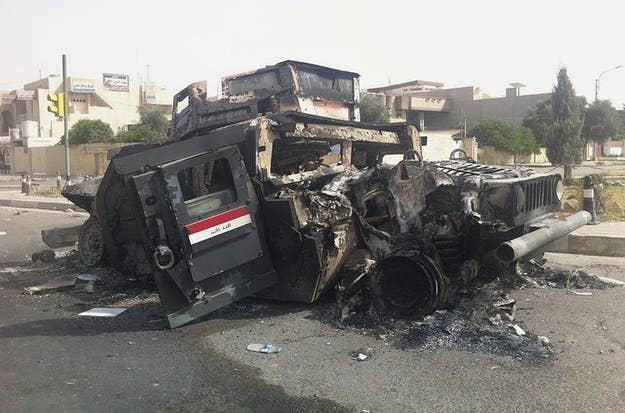
ISTANBUL, Turkey — It was never simply about Syria for the extremists who have overrun Iraq so suddenly this week, even as they built their brand and carved out territory amid the chaos of the war against Bashar al-Assad's regime. They called themselves the Islamic State of Iraq and Syria (ISIS) — and they were deadly serious about the name. The goal was to take big pieces of each nation and use them to build their own, to be ruled by a harsh and rudimentary Islam. The war in Syria was most useful in this sense: A weakened regime gave them room to operate, as well as an easy means of recruitment.
STATEHOOD
For those who say ISIS doesn’t have a strategy. #blackgold
This desire for statehood manifested itself across Syria. ISIS plastered its logo over the towns and cities it controlled with exuberance. Its fighters were said to be irked by the nickname other rebels gave the group — Daesh, its acronym in Arabic — preferring the grandeur of the full title.
Now the offensive sweeping Iraq — a blitzkrieg assault that saw the surprise takeover of Mosul on Monday, and has seen ISIS and allied militants pressing closer by the day to Baghdad — suggests ISIS is booming. And it seems as intent as ever on state-building — taking over banks and security installations, even the airport, in Mosul, Iraq's second-largest city, whose population of 2 million would put it fifth on the list of U.S. cities. As jihadi expert Aaron Zelin noted, taking a look at these boundaries on a map, the territory includes a number of oil refineries. "For those who think ISIS doesn't have a strategy. #blackgold," he wrote.
To be sure, ISIS seems to have collaborated in this offensive with some of Iraq's disenchanted Sunni groups, including Baathist officers from the Saddam Hussein era. And much of its success can be blamed on the dysfunction of the Iraqi state, marred by the U.S. war and the disastrous tenure of Nouri al-Maliki, the Shiite prime minister. Iraqi troops reportedly laid down their arms and fled before the far smaller invading force. Though ISIS leaders are urging their forces onward to Baghdad, it remains to be seen whether the group will hold its recent gains or pull back to its stronghold in Syria.
Regardless, the idea of a possible ISIS state has now been made very real — both to a worried international community, and to potential supporters watching from the sidelines. One of the group's first moves after its win in Mosul, according to images posted by fighters online, was to take commandeered bulldozers and demolish the borderline between Syria and Iraq.
ABDUCTION, IMPRISONMENT, AND TORTURE
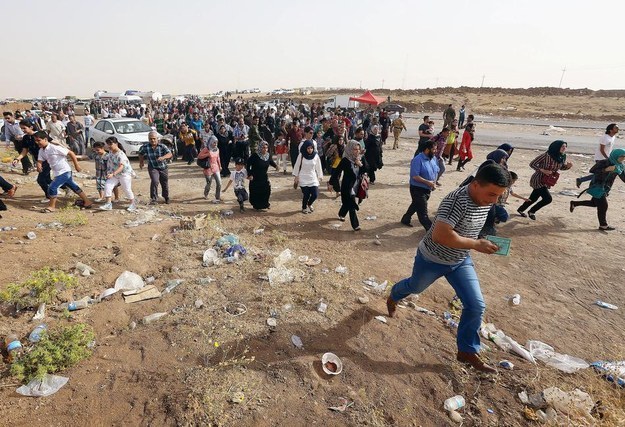
As ISIS grew into one of Syria's most fearsome militant groups, signs of the intensity of its vision became apparent. The group cracked down relentlessly on its opponents, be they regime, fellow rebel, or simply civilian. It employed abduction, imprisonment and torture on a grand scale, beheadings, and crucifixions — all a dark preview for the new reality the group was trying to create.
This brutality made ISIS increasingly unpopular among Syrians, as did the presence among its ranks of so many foreign jihadis, recruited from across the world, from Saudi Arabia to England. These outsiders developed reputations as some of the group's most brutal and extreme members, adding to its image as an alien oppressor. The group's senior leadership, though secretive, was believed to be Iraqi. After those in the organization's ranks came other foreigners, some Syrians complained, saying that local recruits were used mainly as rank and file, guards and frontline soldiers, and fodder for suicide attacks. Other rebel groups launched an internal war against ISIS earlier this year, and even the local branch of al-Qaeda joined the fight — even for them, ISIS had become too extreme. At times, ISIS seemed to be on the ropes in Syria, but its recent gains in Iraq will put that narrative to rest.
SPILLOVER
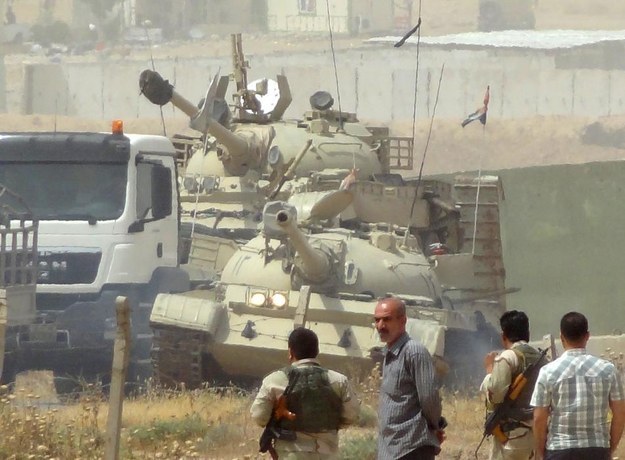
There is a word for the relationship between ISIS's steady growth in Syria and its newfound surge in Iraq: spillover.
Regional spillover is the alarm that has been sounded about the Syrian conflict from the start — often by critics of U.S. policy who called on the White House to put an end to the conflict by helping moderate rebels topple Assad. The risk was that a long war would destabilize Syria's five neighbors, all of them important allies. (The Obama administration's supporters countered that serious U.S. involvement would only magnify the effect.) In Lebanon, which has descended into regular sectarian bloodletting, the spillover happened gradually, in fits and starts. Turkey and Jordan, likewise, were pulled ever deeper into the murky world of offering assistance to the rebels while taking on the burden of hundreds of thousands of refugees.
The recent ISIS surge in Iraq has been far more jarring. It threatens to undermine any progress U.S. forces made before leaving the country in late 2011. It also looks a lot like a worst-case scenario, threatening to throw the region even further into chaos. The world's most dangerous extremists — as many experts now describe ISIS — now control significant territory, appear to be armed with significant weaponry, and have just received a very significant boost to morale. ISIS and its allies captured the Iraqi cities of Ramadi and Fallujah earlier this year, prompting a flurry of international concern that soon dropped from the news headlines. But Mosul is a far greater prize.
REGIONAL FALLOUT
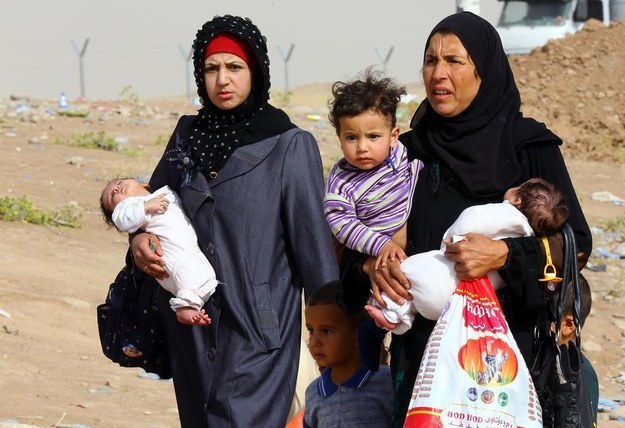
It remains to be seen whether Iraq's neighbors will be drawn into this brewing and sectarian fight. If they do make it to Baghdad, ISIS and its allies will deal a bracing blow to Prime Minister Maliki; with his army in a shambles, he has reportedly turned to irregular Shiite militias. Iraq's Kurds are already up in arms and reportedly skirmishing with ISIS, playing out tensions inflamed by the war in Syria, where ISIS has engaged in bitter fighting with Syrian Kurds.
In Turkey, the military has already sent shells, on occasion, across the border into Syria, aimed at both ISIS and the regime. But the crisis in Iraq threatens to draw in the powerful NATO country even deeper, with ISIS having kidnapped Turkish diplomats and staff from the consulate in Mosul on Wednesday. Markets in Turkey dipped at news of the Mosul offensive while the press has speculated that the Turkish military may somehow intervene. But after years of allowing foreign fighters to cross its borders into northern Syria, Turkey has given ISIS the chance to build up a dangerous presence in its own back yard.
Iran, Maliki's Shiite benefactor, has been heavily engaged in propping up the Assad regime in Syria. It may now see fit to step lend a hand to its ally in Iraq. On Thursday, Iranian President Hassan Rouhani warned that Tehran would not "tolerate this violence and terror."
Smaller countries such as Lebanon and Jordan, meanwhile, would only suffer from any further regional instability. "The problem is that the U.S. expected its regional allies to bear the brunt of the containment of the Syria crisis," said Andrew Tabler, a senior fellow at the the Washington Institute for Near East Policy, adding that the Obama administration's best chance of stemming the ISIS tide is to help its moderate Sunni rivals. "You can't defeat ISIS without having a moderate Sunni force in Syria. The same goes for Iraq."
U.S. SLOW TO REACT
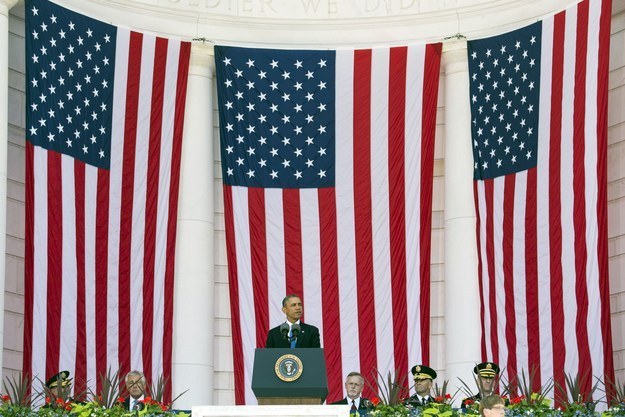
But as in Syria, Iraq's moderate Sunnis are looking weak, and the U.S. will likely remain "late, very late" in addressing such concerns, Tabler said. The Obama administration has been deliberate in its approach of limited action in Syria as elsewhere in the world, as it tries to wean the U.S. public and policymakers off the idea of America as the world's policeman. The U.S. may well stick to that mind-set, even as warnings of spillover and worst-case scenarios sound louder than ever.
